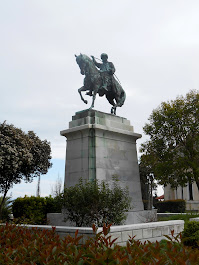To the east of Thessaloniki, on the Macedonian coast, Kavala is an attractive little town. The old town climbs up a hill above the bay, its narrow streets lined with Ottoman-era buildings, with their enclosed balconies reaching out across the road. The roads lead up to the Byzantine fortress, which was extended by the Ottomans. Beyond the hill is an aqueduct, built during the reign of Suleiman the Magnificent, in the 16th century. I enjoyed an evening meal at a restaurant owned by Greek migrants from Georgia, some of the many Black Sea Greeks who have moved to Greece since the end of the Soviet Union, the final extinction of a community going back nearly three millennia. Looking through the menu, I spotted khinkali, a kind of big Georgian ravioli, filled with seasoned minced meat, and a delicious broth that has to be slurped out. It is a Georgian dish, explained the waiter, who then told me that he and his family came from Tbilisi. The khinkali were not bad either. Not the best to be had, but not bad, so far away from Georgia.
Kavala was part of the Ottoman Empire from the late 14th century until 1912. One of its main claims to fame is that it was the birthplace of Mohammed Ali Pasha, father of modern Egypt, which he ruled for the first half of the 19th century. He founded a dynasty that reined until Nasser’s revolution in the 1950s. In 1801, Mohammed Ali had gone to Egypt as second-in-command of an Albanian contingent of an Ottoman force sent to restore authority after Napoleon’s brief occupation. By a mixture of military campaigning, cunning and ruthlessness, he managed to seize control of the whole country. At its height, his power eclipsed that of the Sultan, and for a time his rule extended over much of the Near East, almost reaching Istanbul itself.
But Mohammed Ali did not lose contact with his roots in Kavala. He commissioned the building of the Imaret, a Muslim theological college. Nowadays it has been renovated as a luxury hotel. From the outside, stretched along a hillside overlooking the sea, it is an impressive sight. It has been described as the best preserved Ottoman-era building in Greece. Unfortunately, it was closed for renovation when I visited, so I was unable to see the interior.
Close by the Imaret is Mohammed Ali’s family home, preserved as a museum. Upstairs, a large living room has been restored in the style of a traditional Ottoman haremluk, surrounded by low divans, covered with cushions, a low round table in the middle, and a conical fireplace on the back wall. I had seen such recreations before, in Albania, but what I had not seen before was a restored privy and washroom. I confess I was fascinated. In concept, it was not much different from the outdoor hole in the ground toilets I have encountered in rural areas in the Caucasus and Central Asia.
In a square next to the house is a statue of Mohammed Ali on a horse, in the act of either drawing or sheathing his sword, a rare example of a Greek town honouring one of its sons who was a Muslim, and who was not Greek. But what was Mohammed Ali? I had understood he was Albanian, like the troops who were the backbone of the army he led to Egypt. When, in 2011, I visited the Alabaster Mosque in Cairo, which was commissioned by Mohammed Ali and which contains his mausoleum, my Egyptian guide too described him as Albanian (see post of 5 January 2012). But the young Greek guide at Mohammed Ali’s house in Kavala told me this was disputed, and that in Turkey he was claimed as a Turk. It was claimed, so he told me, that the notion that Mohammed Ali was Albanian was a misunderstanding caused by the fact that the troops that he led to Egypt were Albanian. The issue could apparently inflame passions. The young man told me of an occasion when parties of Turks and Albanians visiting the house at the same time had a fierce row over the matter.
In the Ottoman period, the question of Mohammed Ali’s nationality would have been of secondary importance. He was an Ottoman Muslim, and that was what counted. Although he ruled over Egypt, he never learned Arabic, and the language of his court was Turkish. Some contemporary diplomatic visitors claimed his native language was Albanian. But indeed, he might in any case have known the language of his soldiers. The young Greek at Mohammed Ali’s house in Kavala told me that at the time of his birth, in 1769, the population of Kavala was almost entirely Turkish, with just a very small Christian population. He thought there would have been very few Albanians there, apart from the soldiers of the garrison. Yet there were Albanians almost everywhere in Greece during the Ottoman period, including nearby Salonika. With the information I had, I could not conclude either way. I had liked the idea that an Albanian, a chancer from one of Europe’s smaller nations, had become ruler of an Empire in Egypt, Sudan, western Arabia and the Levant, and one of the most notable historical figures of his day.



No comments:
Post a Comment